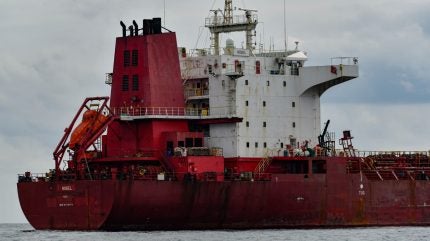
Denmark is planning to target the infamous shadow fleet of tankers carrying sanctioned Russian oil through the Baltic Sea and Danish Straits, its Foreign Minister Lars Løkke Rasmussen said yesterday (17 June).
The Nordic country is holding talks with other Baltic Sea states and EU members about how to impede Russia’s sanctions-dodging fleet, which is said to number around 1,400 vessels, including 435 tankers.
Roughly one-third of Russia’s seaborne oil exports pass through the Danish Straits. This accounts for 1.5% of global oil supply – meaning any attempt to limit the shadow fleet’s supplies could prompt a rise in oil prices and dent Moscow’s money pot.
"The shadow fleet is an international problem that requires international solutions. We are continuously looking at opportunities for further action targeting the shadow fleet in the EU,” Rasmussen told Offshore Technology. "This also applies to Russian and other companies that directly or indirectly assist the shadow fleet if they meet the conditions for being sanctioned and a consensus can be reached in the EU.”
Rasmussen did not specify the exact measures the Danish naval authorities would take against the shadow fleet.
Denmark's Foreign Ministry subsequently clarified it will ensure all measures "are legally sustainable, including in relation to international law".

US Tariffs are shifting - will you react or anticipate?
Don’t let policy changes catch you off guard. Stay proactive with real-time data and expert analysis.
By GlobalData"Denmark takes the challenges of the shadow fleet very seriously, and we are in an ongoing, confidential dialogue about the shadow fleet with our partners, including other Baltic Sea coastal states and in the EU", a spokesperson told Offshore Technology. "There is a broad consensus that the shadow fleet is an international problem and that international solutions are needed. Therefore, Denmark has gathered a circle of countries to look at the possibilities for further measures against the shadow fleet."
What is Russia’s shadow fleet?
The name shadow fleet (or dark fleet) comes from the practice of ’going dark’ – intentionally disabling a ship’s automatic identification system (AIS).
While deactivating an AIS is not technically illegal, it is strongly associated with underhand motives as it allows ships to move untracked. Legitimate reasons include technical issues, bad weather and safety concerns, such as travelling through a conflict zone or a piracy hotspot.
Denmark’s government is also concerned that these tankers, which are often old and insured outside of Western nations, could be damaging the local environment, Reuters reported. Most lack oil spill insurance, according to the Kyiv School of Economics.
These vessels frequently change their flag registration, although many have targeted Gabon and Eswatini as two countries which are willing to accept most entrants to their maritime registries.
In April, reports surfaced that Russia’s shadow fleet was loitering just off the coast of Gotland, a strategically key Swedish island.
Denmark’s plan comes as EU member states ramp up measures to indirectly fight Russia as the Kremlin continues its invasion of Ukraine.
Last Thursday (13 June), the UK imposed 50 new sanctions on Russia in part targeting its shadow fleet. UK Foreign Secretary David Cameron described the move as “starving Putin of the revenue he desperately needs to fund his war chest and making it harder to supply his war machine.”
On the same day, the EU and G7 alliance announced its decision to use the annual interest from frozen Russian assets to pay off interest on a $50bn loan for Ukraine’s war effort.


